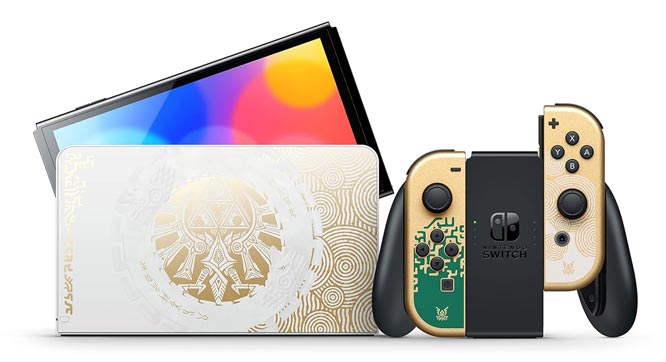
Nintendo Switch – OLED Model – The Legend of Zelda: Tears of the Kingdom Edition
7 years into the console’s lifespan, this feels more like a retrospective than a review. It sold incredibly well and most people have made up their minds already.
Switch is a major triumph for Nintendo. It was their big comeback, selling record-high numbers, after the poor sales of the Wii U. It also merged Nintendo’s portable gaming and console gaming, so that players can experience everything in one platform.
There are two major cruxes of the Switch
- You’re a big fan of Nintendo exclusives. In that case, you buy whatever Nintendo’s latest system is to experience them.
- You’re looking for a portable gaming experience (i.e. you a travel a lot, game on the go, or want to game in different rooms of the house).
When Switch first came out, much of its library was remasters and ports from the Wii U, which was great for the many people who never bought the Wii U, but underwhelming for people who already have. Though the past few years, Nintendo has amassed a respectable line-up of Switch exclusives.
And regarding the portability aspect, this depends on your preferences and lifestyle. Since this console doesn’t have 4K output, streaming services or current-gen third party titles, it might not be your main living room box.
The color quality of the Switch OLED’s screen is gorgeous, but nonetheless, I ended up using it docked on the TV anyway (bigger screen, more resolution, better sound). Personally, I tend to game at home, and when I’m on the go, I’m usually out interacting with people or doing other things aside from gaming, so I didn’t benefit from this. Though there are plenty of people who will benefit from it.
But one defining aspect of the Switch – which is arguably a downside – is how it has handled digital titles:
- It’s the only current console with no backwards compatibility. No one expects Wii U discs to fit inside of a Switch, it is unfortunate that the digital titles on the Wii U don’t carry over.
- Nintendo removed the ‘Virtual Console’ (digital sales of older titles), meaning many classic games have no way to be played on modern hardware. This is in part so that Nintendo can sell remasters of 10-20 year old games for $40-60.
- Other digital stores like Steam, Epic, Playstation and Xbox have significant sales, while Nintendo’s sales are modest and few.
This is a tradeoff. This does benefit physical collectors who have already purchased the games and want them to retain their value. But it means higher prices for people who aren’t digital collectors. Despite the console itself being cheaper than PS5/Xbox, factoring in the higher game prices, is a higher total cost of ownership.
There’s been conversations lately on inflation and how corporations will have record profits yet still sell goods at high prices. By gutting digital releases has enabled Nintendo to make remasters (with very little changes or improvements) that sell for nearly full price. I feel like Nintendo is part of the problem.
I may be a minority. Switch and its games have record-high sales, so it is serving an audience. This is in part due to the good will Nintendo has built for decades. But continuing further down this path may erode some of that good will.
Overall. Hardware, dated but still a great hybrid concept to this day. Software: excellent first party. Business practices: Questionable.